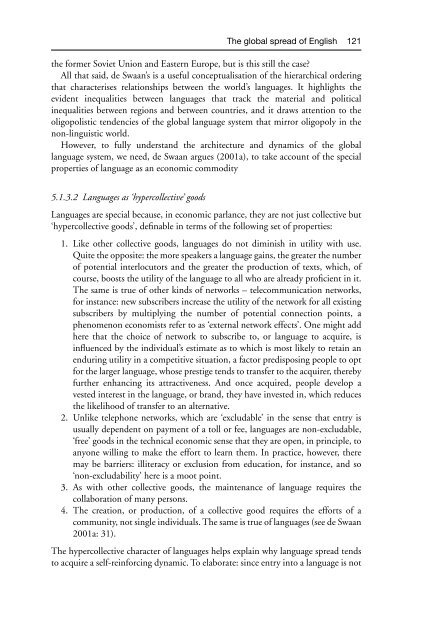Gibson Ferguson Language Planning and Education Edinburgh ...
Gibson Ferguson Language Planning and Education Edinburgh ...
Gibson Ferguson Language Planning and Education Edinburgh ...
Create successful ePaper yourself
Turn your PDF publications into a flip-book with our unique Google optimized e-Paper software.
The global spread of English 121<br />
the former Soviet Union <strong>and</strong> Eastern Europe, but is this still the case?<br />
All that said, de Swaan’s is a useful conceptualisation of the hierarchical ordering<br />
that characterises relationships between the world’s languages. It highlights the<br />
evident inequalities between languages that track the material <strong>and</strong> political<br />
inequalities between regions <strong>and</strong> between countries, <strong>and</strong> it draws attention to the<br />
oligopolistic tendencies of the global language system that mirror oligopoly in the<br />
non-linguistic world.<br />
However, to fully underst<strong>and</strong> the architecture <strong>and</strong> dynamics of the global<br />
language system, we need, de Swaan argues (2001a), to take account of the special<br />
properties of language as an economic commodity<br />
5.1.3.2 <strong>Language</strong>s as ‘hypercollective’ goods<br />
<strong>Language</strong>s are special because, in economic parlance, they are not just collective but<br />
‘hypercollective goods’, definable in terms of the following set of properties:<br />
1. Like other collective goods, languages do not diminish in utility with use.<br />
Quite the opposite: the more speakers a language gains, the greater the number<br />
of potential interlocutors <strong>and</strong> the greater the production of texts, which, of<br />
course, boosts the utility of the language to all who are already proficient in it.<br />
The same is true of other kinds of networks – telecommunication networks,<br />
for instance: new subscribers increase the utility of the network for all existing<br />
subscribers by multiplying the number of potential connection points, a<br />
phenomenon economists refer to as ‘external network effects’. One might add<br />
here that the choice of network to subscribe to, or language to acquire, is<br />
influenced by the individual’s estimate as to which is most likely to retain an<br />
enduring utility in a competitive situation, a factor predisposing people to opt<br />
for the larger language, whose prestige tends to transfer to the acquirer, thereby<br />
further enhancing its attractiveness. And once acquired, people develop a<br />
vested interest in the language, or br<strong>and</strong>, they have invested in, which reduces<br />
the likelihood of transfer to an alternative.<br />
2. Unlike telephone networks, which are ‘excludable’ in the sense that entry is<br />
usually dependent on payment of a toll or fee, languages are non-excludable,<br />
‘free’ goods in the technical economic sense that they are open, in principle, to<br />
anyone willing to make the effort to learn them. In practice, however, there<br />
may be barriers: illiteracy or exclusion from education, for instance, <strong>and</strong> so<br />
‘non-excludability’ here is a moot point.<br />
3. As with other collective goods, the maintenance of language requires the<br />
collaboration of many persons.<br />
4. The creation, or production, of a collective good requires the efforts of a<br />
community, not single individuals. The same is true of languages (see de Swaan<br />
2001a: 31).<br />
The hypercollective character of languages helps explain why language spread tends<br />
to acquire a self-reinforcing dynamic. To elaborate: since entry into a language is not






